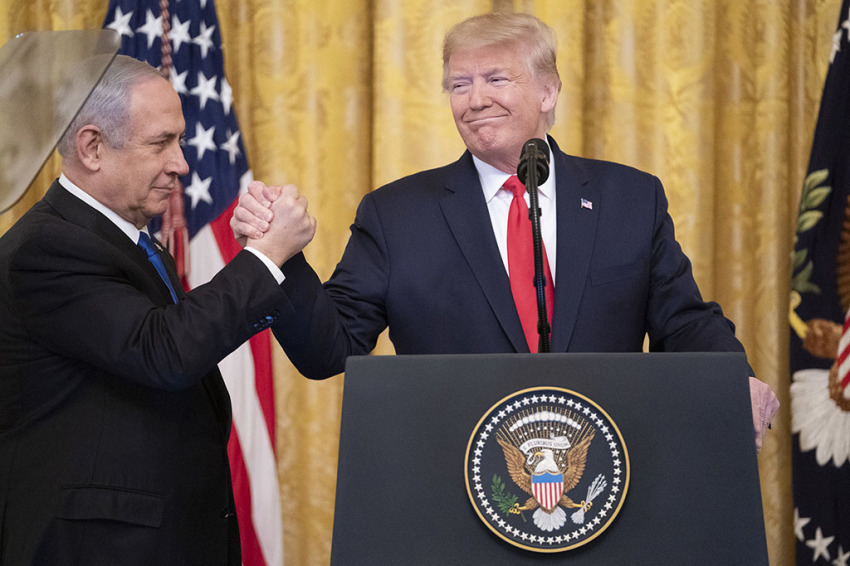Trump says Evangelicals 'love Israel more than Jews' in America, accused of antisemitism

Former President Donald Trump has been accused of authoring an antisemitic trope when he recently claimed that Evangelical Christians in the United States love Israel more than Jewish people in the U.S.
In an interview with Tel Aviv-based Israeli journalist Barak Ravid for a new book on how the U.S.-led Abraham Accords are changing the political dynamics of the Middle East, Trump recounted his relationship with former Israeli Prime Minister Benjamin Netanyahu and offered his thoughts on the state of U.S.-Israeli relations.
Ravid’s book, which was just released and is available only in Israel, is titled Trump’s Peace: The Abraham Accords and the Reshaping of the Middle East.
In comments that some in the mass media saw as “jaw-dropping,” Trump also remarked in his 90-minute interview about which religious groups in the U.S. love Israel.
The comments were first heard on Yonit Levi’s podcast “Unholy.” Levi is a journalist with Israel’s Channel 12, who together with a Guardian journalist, played audio sound bites from Ravid.
“There are people in this country that are Jewish [yet] no longer love Israel,” Trump said.
“I’ll tell you, the Evangelical Christians love Israel more than Jews in this country.”
“It used to be that Israel had absolute power over Congress,” he continued. “And today, I think it’s the exact opposite. And I think Obama and Biden did that. Yet in the election, they still get a lot of votes from Jewish people, which tells you that the Jewish people ... in the United States either don’t like Israel or don’t care about Israel.”
New quotes from Trump to @BarakRavid: Most US Jews don't love Israel. Exclusive for Unholy podcast
— Yonit Levi (@LeviYonit) December 17, 2021
@Freedlandpic.twitter.com/Hv4joYkbCN
He expressly referred to The New York Times, claiming that the national newspaper “hates Israel” and that the Sulzberger family that runs The New York Times is Jewish.
Major Jewish groups, such as the Anti-Defamation League and the American Jewish Committee, issued statements in response, saying that Trump’s remarks were outrageous and furthered antisemitic stereotypes.
“His past support for Israel doesn’t give him license to traffic in radioactive anti-Semitic tropes — or peddle unfounded conclusions about the unbreakable ties that bind American Jews to Israel. Enough!” the AJC said in a Friday tweet.
ADL CEO Jonathan Greenblatt told CNN in an interview Friday that Trump’s comment “plays into this trope about Jews controlling media.”
“Antisemitism is a conspiracy theory,” he said. “It adapts and it morphs and it shapes to the times and the particular pathologies of the person pushing out the prejudice. That is what we have here.”
Ravid, however, said on the “Unholy” podcast that he does not consider the 45th president antisemitic, noting that Trump's son-in-law is Jewish, his daughter converted to Judaism, he has Jewish grandchildren and has several Jewish advisors.
Conservative Jews were not surprised by Trump’s remarks.
In a retweet of Levi, Newsweek opinion editor Josh Hammer clarified: “The actual quote is, ‘either don’t like Israel or don’t care about Israel.’” Hammer added: “And sadly, he’s right.”
Echoing Ravid, Josh Mandel, a Jewish man and former state treasurer of Ohio running for the Republican nomination for the U.S. Senate, tweeted: “Unlike most liberal Jews, President Trump actually has Jewish grandkids.”
“Trump was the best President for Israel and the Jewish people. Period,” Mandel argued.
During the interviews Ravid conducted in April, which totaled 90 minutes, Trump reportedly revealed that he hadn’t spoken to Netanyahu since the 2020 elections and felt blindsided when Netanyahu announced at the White House in January 2020 that Israel intended to apply Israeli sovereignty to approximately 30% of the West Bank. The West Bank is often referred to as either “disputed territories” or “occupied territories,” depending on one’s political perspective.
The author said that then-U.S. Ambassador to Israel David Friedman did not tell Trump of Netanyahu’s plan and that Trump later said to his advisors in a private meeting, “What the Hell was that?”
Friedman has claimed that Ravid’s version of this is “false," according to AllIsrael.com.
Ravid also reported that during the winter of 2020, Jared Kushner, Trump’s son-in-law and one of the leading figures working on the peace deal, once became so angry with Israeli Ambassador to the U.S. Ron Dermer that he threw Dermer out of his office.
Ravid’s account also notes that Trump was furious with Netanyahu for publicly congratulating Biden when the 2020 presidential election results were declared, going so far as to drop the F-bomb and accuse the former Israeli prime minister of being disloyal.
Another aspect of the tension between Trump and Netanyahu, as described by Ravid in Trump’s Peace, is one day before the historic peace deal between Israel and the United Arab Emirates was announced in August 2020. Netanyahu reportedly tried to leave the agreement, afraid it could damage his re-election campaign.
Earlier this year, Netanyahu was ultimately ousted and replaced by his former ally Naftali Bennett, who formed a coalition with left-wing and secular Israeli political parties. Yair Lapid, the leader of one of those parties, formed a rotation government with Bennett and is the alternate prime minister.



























